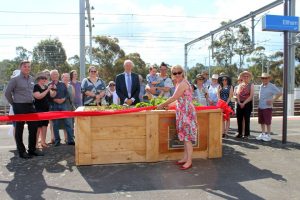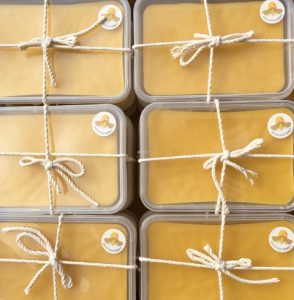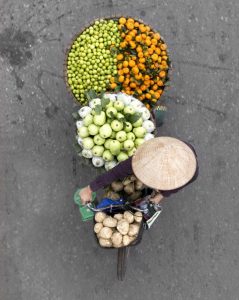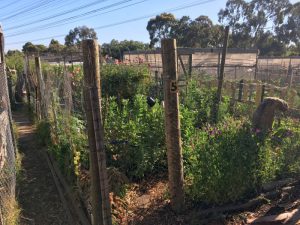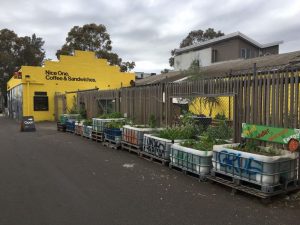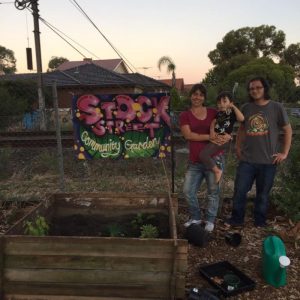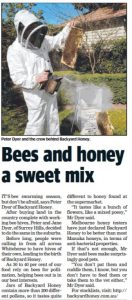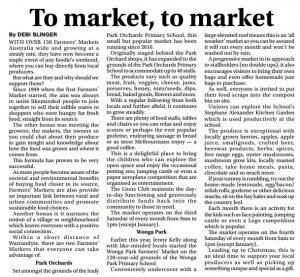Marina Bistrin interviews Robin and Paul Gale-Baker
Many of you will know Robin and Paul through Sustainable Macleod, the Macleod Veggie Swap or the Macleod Organic Community Garden. Or you might know Robin from her various presentations on fruit tree pruning and vegetable growing. Or you might know Paul through his wicking beds, including the ones that he recently built for Incredible Edible Eltham. Marina has now interviewed Robin and Paul as home growers. Here is how Marina introduces their garden: “As I look at the current back garden on their quarter acre block, I see that it is varied and essentially divides into ‘rooms’ but still holds together as one theme. It is a potager garden featuring mainly Mediterranean plants. Up the centre of the garden, in a T formation, is a faded red brick path … On the left bank is a long curving hedge of flowering lavender in front of which grow culinary herbs and orange calendula and behind which is an almond tree, persimmon, olive, pomegranate and feijoa, all underlaid with herbs … On the right bank, in the foreground, are more small-leaved herbs – thymes and savouries – draping over a wall of wooden sleepers and these break up the straight lines of garden edging.” Read the full interview.
Marina is one of 5(!) people who have come forward and offered to do some home grower interviews following Helen Simpson’s ‘retirement’. We now need to find some people for them to interview! If you would be willing to be interviewed, or you know someone who has an interesting garden, email me. Finally, here is what someone has written in about Helen: “Helen’s articles have been a real highlight of the newsletter for me. She has been very generous with her time in doing them, she writes very well, and her efforts have been greatly appreciated.“
What seeds to plant in November
Here is a list (see the planting guide for more detail):
Warm season veggies
Beans
Cucumber
Gourd
Okra
Peanut
Pumpkin
Rockmelon
Sweetcorn |
Perennial herbs
Lemon balm
Oregano
Rosemary
Sage
Tarragon
|
Other veggies and herbs
Asparagus
Beetroot
Carrot
Chives
Globe artichoke
Jerusalem artichoke
Lettuce
Mustard greens
Parsley
Radish
Rocket
Silverbeet
Sweet potato |
Compared with October, the list gets shorter, with some summer veggies dropping off (e.g. rockmelon and zucchini) and with nothing added.
Mac’s tip of the week
“Now is the time to start checking your grape vines for the caterpillars of the grapevine moth. These black and white day-flying moths (not butterflies) lay their eggs on the under-sides of the leaves and it doesn’t take long before the holes appear. As they grow, these caterpillars can eat up to 6 leaves a day each as well as the developing grapes, and severe defoliation can therefore happen. Hand pick as often as you can. If you can’t reach, or numbers are too many, you can use low-toxic, organic bacterial sprays such as Dipel or Success. For those of you with young children, or are still inspired by the wonders of nature, put some caterpillars in a ‘bug catcher’, or large container with air holes. Feed them your chosen leaves and watch them grow and pupate.”
Read all of Mac’s tips.
No food swap at Diamond Creek this weekend
Pam Jenkins is away and, as a result, the Diamond Creek food swap has been cancelled.
Incredible Edible Eltham news
There are still spaces available at the official opening on 13th November at 4pm. Register your attendance now before it is too late. Meet on the railway platform at 4pm and then retire to Platform 3095 cafe and bar for complementary tapas, coffee and a free drink. Local notables who will be present include Vicki Ward MP, Mayor Peter Clarke, Sean Spencer (CEO healthAbility), Felicity Gordon (the project’s artist), Paul Gale-Baker and Paul Morland (who jointly led the building of the wicking beds).
Some news about future Eltham Farmers’ Markets
Eltham Farmers’ Market is now weekly, on every Sunday of the year (apart from Christmas Eve, etc)!
Going weekly means there are many new stallholders. On 5th November, 11(!) stallholders will be making their debut. 6 of these are from North East Melbourne:
- A Local Baker St Andrews, from St Andrews, will be selling organic sourdough bread and croissant.
- Kaz’s Chai, from Research, will be selling chai tea.
- La Villa Salumi, from Kilsyth, will be selling pork sausages, bacon and smoked smallgoods.
- Take Me Home, from Coburg, will be selling pastas, gnocchi, pizza bases, pasta sauces and crostatas.
- The Cake Stall, from Eltham, will be selling cakes and croissants. Also, sausage rolls, pies and quiche.
- The Mrs & Co, from Mt Evelyn, will be selling muesli.
The other 5 are from elsewhere in Victoria:
- Mount Prospect Farm will be selling a wide range of vegetables.
- PEACE farm will be selling a wide range of vegetables.
- Ross Tomatoes will be selling tomatoes.
- Silva Coffee will be selling coffee, hot chocolate, chai and tea.
- Thriving Foods Farm will be selling a wide range of vegetables. Also, eggs.
Those of you who go to the market will know that Local Food Connect has an information marquee where members of the public can ask questions, take away leaflets, etc. With the market going weekly, we need to increase the pool of volunteers who man the marquee. Most of the questions are easy to answer and, if necessary, you can always refer the more difficult ones to ‘a higher authority’ (i.e. one of us). Training will also be available from Pam Jenkins and myself. If interested, email Pam.
Some news from the last Eltham Farmers’ Market
At the last Eltham Farmers’ Market, Maria Ciavarella, from My Green Garden demonstrated how to make onion jam/relish. Here is her recipe.
S J Crawford (aka Penny and Amber) will no longer be a stallholder at the market. The Crawford family are retiring from farming, having been at every Eltham market since our very first one in April 2014. Penny, plus daughter Amber, have been the main face of the Crawford presence while Stephen has been the farmer. Thanks for all your great produce over those years and for the warm and friendly way that you dealt with the public. You will be missed.
More community gardens in Moreland
Three more (CERES, Jewell (Brunswick) and Stock Street (Coburg)). Another way of viewing the material is via the community gardening section of the Local Food Directory. They have also been included on the map of where all the community gardens are.
Lee Tozzi is Moreland’s ‘new’ Food System Officer
The ‘new’ is in inverted commas because, although I have only just found out, Lee was apparently appointed 5 months ago. She is also continuing as Darebin’s Sustainable Food Officer. With her Moreland hat on, you can contact Lee by email or by phone (9240 1111 – Tuesdays and Thursdays only). Congratulations, Lee!
Local food news
The ready made meals of Carlton’s We Feed you are now available at Apples and Sage Organic Wholefoods, Balwyn. DIVRS’s and Darebin Fruit Squad’s Harvesting the Urban Orchard project was given a Highly Commended award in the Keep Victoria Beautiful Sustainable City Awards.
‘Crowd harvest’ – Father’s Day
Gardeners everywhere often harvest more seeds than they can sensibly store. Gardeners with excess seeds are invited to send them in a Christmas card or holiday card to one or more not-for profit organisations listed below, each of which has a certified horticulturalist employed and ready to look after the seeds, either to start the seeds, store the seeds or distribute to others in need who know how to start seeds. Asylum Seeker Resource Centre in Footscray, DIVRS in Preston, STREAT in Collingwood or Carrington Health in Box Hill (ask for Alex Salmon). Any questions, contact Cath Lyons (aka Tiny Trowel) by phone (0401 814679) or email.
Want to adopt a beehive?
Create Your Good Life are looking for homes in the Croydon, Ringwood, Chirnside, Warrandyte areas to host a beehive in their backyards. There is no cost to you. If interested, read their Facebook post.
Want to be on Gardening Australia?
Are you renovating a small garden space soon? If so, Gardening Australia would like to come and film your project – it could be a courtyard, a veggie patch, a balcony, a verge or other SMALL area. Send a picture of your space and a sentence or two about you and your plans to mygarden@your.abc.net.au (read their original Facebook post).
Can you sprout a corn cob?
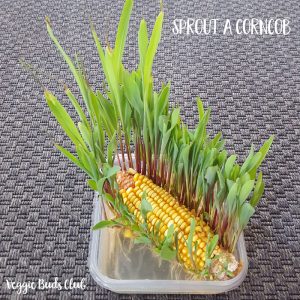 According to this website, you can: “Simply fill a dish with 1 inch of water and place the corn cob in the water … Within a few days you will begin to see the shoots sprout upwards, you will also see the roots grow in the water.”
According to this website, you can: “Simply fill a dish with 1 inch of water and place the corn cob in the water … Within a few days you will begin to see the shoots sprout upwards, you will also see the roots grow in the water.”
11 useful food hacks
This video, which gives 11 specific tips about food preparation, has apparently been watched 55 million times.
Proverb of the month
What’s sauce for the goose is sauce for the gander. Meaning: the same set of rules remain applicable to both men and women (a ‘gander’ is a male goose); alternatively, if something is acceptable for one person, then it is (or should be) equally so for another. Literal meaning: the same sauce applies equally well to cooked geese regardless of their gender.
The proverb dates back to the 17th century but there were similar expressions going back a further 100 years (e.g. “As well for the coowe calfe as for the bull”, from 1549).
Incidently, barnacle geese are so-called because it was thought, in medieval times, that they were the adult form of goose barnacles. This was apparently because barnacle geese were never seen to nest in Europe (unbeknownst to the medievalists, they breed in places like Greenland) and have similar colouration to goose barnacles. Since barnacle geese were thought to be “neither flesh, nor born of flesh”, they were allowed to be eaten on days when eating meat was forbidden by Christianity.
Alert readers may remember that the very first proverb discussed in this newsletter was “fine words butter no parsnips“. Well, Claire Miller has submitted a very funny video which features the phrase.
Read all the proverbs.
Quote of the month
“I think we all have a dream of what it would be like not to work and grow heirloom tomatoes, and I do have that dream. It would be lovely. I do love gardening and all of that, but I also love my work.” by Helen Mirren.
Joke of the week
Why did the clock in the cafe run slow? It always went back four seconds!
Read all the jokes.
New events – Backyard Harvest Festival
The annual Backyard Harvest Festival (previously called the Darebin Backyard Harvest Festival) is taking place 18-26 November and will include gardens and workshops from Moreland as well as Darebin. All the garden tours and workshops are discussed below and each costs $10 ($5 concession). If you have any questions, contact Tina Stagg by phone (8470 8673) or email.
Harry’s micro orchard garden
What: Harry is passionate about gardening in small spaces and has been lovingly tending his fully organic micro orchard garden for 13 years. At 72 square metres, this garden demonstrates you don’t need a large plot of land to grow a wide variety of fruits and vegetables. Harry planned, constructed and planted the garden with his daughter to encourage science concepts through organic gardening. Clever grafting methods yield citruses, apples, pomegranates and stone fruits. The all year rotation of herbs and seasonal vegetables supplement the food requirements for a family of five
When: Saturday, 18th November, 10-11am.
Where: Northcote.
Bookings: Eventbrite.
Backyard beekeeping with Benedict Hughes, the practical beekeeper
What: As The Practical Beekeeper, Benedict Hughes collects swarms, manages hives, extracts honey, teaches and loves bees. He is a member of the Beekeeper State Quarantine Response Team with the Victorian Government (emergency beekeeper) and is approved by Darebin Council to keep bees in Darebin Parklands and Bundoora Park. This interactive, hands on workshop will introduce you to backyard beekeeping and urban honey production. Learn about the bee lifecycle, starting a new hive, beekeeping equipment, hive management and honey extraction. You will have access to bee hives and educational bee display. Participants will receive a full set of handouts. Suitable for both beginners and the more experienced beekeeper.
When: Saturday, 18th November, 10-midday.
Where: CERES.
Bookings: Eventbrite.
Citrus and apple tree propagating workshop with Harry Kalathas
What: There’s nothing more satisfying than propagating your own plants. In this workshop, Harry will demonstrate two propagating techniques for citrus and apple trees: basic aerial layering and grafting. You will gain an understanding of the tools and equipment and seasonal timing requirements for each technique as well as how to take care of grafts and propagated plants during their initial growing period.
When: Saturday, 18th November, 11.15am-12.15pm.
Where: Northcote.
Bookings: Eventbrite.
Kat’s permaculture home garden
What: Kat Lavers is a passionate gardener, permaculture designer, trainer and facilitator. She coordinates the My Smart Garden program for Hobsons Bay City Council, runs Green Steps training for Monash University and has taught permaculture in Australia and Mongolia. Her house and garden, ‘The Plummery’, is a small-scale urban permaculture system. The 1/14 acre site produces almost all the veggies, herbs, fruit, mushrooms and electricity consumed by the household, as well as recycling all organic waste on site. There is also a retrofitted light earth studio made from on site clay and re-claimed materials.
When: Saturday, 18th November, 12.45-1.45pm.
Where: Northcote.
Bookings: Eventbrite.
Keeping quails with Kat Lavers
What: Keeping quails is a fantastic way to produce eggs in a small garden. They are quieter than chickens and hardy too. In this workshop, Kat will introduce you to her covey of quails and discuss their food and housing needs, including tips and tricks to reduce maintenance. And of course you will also taste some delicious quail eggs!
When: Saturday, 18th November, 2-3pm.
Where: Northcote.
Bookings: Eventbrite.
Lena’s courtyard garden
What: Lena is in the first year of establishing a permaculture-inspired garden in her 40 square metre courtyard. The plan is to fill this space with as many productive plants as possible whilst attracting bees and other beneficial insects. A fascination for making the best of small spaces for gardening motivates this project, and Lena will provide tips to maximise production and small space gardening resources. Re-localisation of food production, the facilitation of social connection, the rethinking of the economy of consumption and improved care for the natural environment have become a prism through which Lena’s decisions are made in all aspects of life. To Lena, life is so much more interesting living mindfully and simply!
When: Saturday, 18th November, 3.30-4.30pm.
Where: Thornbury.
Bookings: Eventbrite.
Michael and Dru’s cottage food garden
What: Michael and Dru have lovingly turned the front and back yard of his rented home into an attractive and productive food garden without breaking the bank. Tidy garden beds, pretty brick baths, a rustic chook shed and greenhouse have all been built through the ingenious use of recycled materials. Chickens are integral, producing eggs and disposing of household scraps and providing valuable fertiliser, but are also cleverly managed to prevent them from decimating precious vegetables. The front garden is reminiscent of a European cottage garden with plenty of bee-attracting flowering plants among the herbs, while the rear is devoted to vegetables and fruit trees, including a feature fig. Vegetables and greens are carefully selected to ensure that the household has a supply of fresh produce all year round. Includes a demonstration of how to get the most out of homemade compost in each season.
When: Sunday, 19th November, 10-11am.
Where: Preston.
Bookings: Eventbrite.
Maya’s exotic edible garden
What: Maya has created an edible garden that is as beautiful as it is fruitful. Decorative, highly productive hedges are formed from an extensive range of pruned and grafted fruit trees using a unique combination of espalier, cordon, ‘Bouche Thomas’ and dwarfing rootstock to create intriguing shapes and patterns. The garden features 28 apple trees of several varieties, a range of cane and bush berries, persimmons, cherry guavas, feijoas and citrus. Mature grape vines are trained against the house, helping cool it in summer and yielding delicious summer grapes. Maya practices organic and biodynamic gardening methods complete with recycled rain water and extensive composting systems. A netted chicken fence protects the rear garden from striking ‘Araucana’ chickens, originally bred in South America, who are kept as much for their wonderfully friendly nature as for their beautiful pale blue eggs. A home-built coffee roaster in the backyard completes the picture. This garden is a delight to all the senses, not just the tastebuds!
When: Sunday, 19th November, 11.15am-12.15pm.
Where: Preston.
Bookings: Eventbrite.
Kelly’s re-purposed food garden
What: This multi-purpose garden was established in 2014 with an impatient, hopeful, and feeble attempt at growing a sweet potato in heavy clay soil. The acceptance of reality lead to the introduction of growing boxes and started the continuous work to improve the soil. Based around principles of sustainability and a complete inability to dispose of anything that hasn’t been utilised a number of times, much of the infrastructure in the garden is made from materials collected from hard rubbish and building sites or re-purposed from a previous life; even from within the garden itself. The garden includes established and young fruit trees, vegetables and herbs, children and toys, chickens and bees, ornamental plants, lawn, and often some kind of construction project. It is a flexible and evolving space that everyone in the house loves to be in.
When: Sunday, 19th November, 11.30am-12.30pm.
Where: Fawkner.
Bookings: Eventbrite.
Katrina’s beneficial insect food garden
What: As a passionate Preston home gardener, Katrina Forstner has created a native bee friendly garden full of fruit trees, vegetables, perennial and native flowers and chickens. Find out more about attracting beneficial insects and how this productive garden thrives with homemade compost with locally sourced green waste, pest control and fertiliser courtesy of the resident chickens. Over fifteen fruit trees, grapes, berries, and pollinator attracting flowers along with several bee hotels dotted around the garden, have created a native bee haven. This garden is part of ongoing research undertaken by Melbourne University VEIL Urban Food project which measures the input and outputs of a home garden in the context of a sustainable city food system.
When: Sunday, 19th November, 12.45-1.45pm.
Where: Preston.
Bookings: Eventbrite.
Pam’s fruitful garden
What: Pam has created a lush productive garden with a huge range of fruit trees most of which she grafted herself. There are over 70 varieties, including cherries, plums, apples, pears and citrus, as well as lots of berries, including blueberries. The garden is carefully planned with a structured layout and variety of intensive training systems to maximise fruit production. Many of the fruit trees and berries are in large pots to help manage a neutral/alkaline soil and for those areas unsuitable for in-ground planting. The microclimate created by a tall building at the rear of the block enables Pam to grow tropical plants including fruiting bananas and avocados and edible bamboos for screening and food. Wicking beds have just been installed to provide a consistent water supply to vegetables and herbs, particularly in the summer heat. Most of the rest of the garden, including pots, is watered by a drip system that can be set to automatic mode.
When: Sunday, 19th November, 1-2pm.
Where: Coburg.
Bookings: Eventbrite.
Katrina’s bee hotel workshop
What: In celebration of National Pollinator Week, go along to this fascinating workshop about native bees. Katrina Forstner founder of Buzz and Dig will introduce you to the amazing world of native bees and how to attract them in to your garden as valuable pollinators for your flowers and edibles. Learn first hand why native bees are so important in urban gardens and make your very own bee hotel using materials sourced from the garden and recycled materials. You will be rewarded with increased biodiversity and better pollination and from these friendly little bees.
When: Sunday, 19th November, 2-3pm.
Where: Preston.
Bookings: Eventbrite.
‘Rani’s patch’ and multicultural food garden
What: Rani and her neighbourhood of wonderful gardeners have transformed the once barren treeless bike path south of Batman Station into a lush garden known as ‘Rani’s Patch’. Part of the Upfield urban forest, edibles and non-edibles are woven together to create a scented, colourful vista of vegetation. Riders and walkers can even stop and read a book from Rani’s library. The tour also includes Rani’s home food garden which is no less inspiring. Her love of cooking from many cultures including traditional Bangladeshi dishes is reflected in the diverse range of vegetables and herbs she grows. Indian spinach (‘puisak’), bitter gourd (‘korolla’), and thistle grow alongside kaffir lime, turnip, kale, eggplant, persimmon, pomegranate and nectarine. Children at Rani’s day care centre grow food too, helping them learn where food comes from and how it is used in different cultures.
When: Sunday, 19th November, 2.30-4pm.
Where: Coburg.
Bookings: Eventbrite.
Angelo’s fertile food forest
What: Angelo (Deep Green Permaculture) is a sustainable gardening and permaculture presenter, trainer and writer and passionate food forest advocate. His garden won a Darebin Sustainability Award in 2012, and was featured in the prestigious Open Gardens Australia event in 2014 and 2015. Angelo’s high density food forest garden produces a huge diversity of food – stone fruits, berries, herbs and vegetables. What appears to be a verdant tumble of vegetation is actually strategic placement to create synergistic relationships and enhance the micro-climate and growing conditions for each plant. This is also an effective pest control technique resulting in a wonderfully abundant organic garden.
When: Sunday, 19th November, 3.15-4.15pm.
Where: Preston.
Bookings: Eventbrite.
Steve and Georgia’s mini suburban farm
What: Steve and Georgia have transformed their home to a suburban mini-farm in seven years. Their garden includes over 90 fruit trees pruned to a range of forms, including espaliers, to increase productivity and make the most of spaces. It also features a front yard food forest, berries, raised veggie beds, bees and chickens. Companion planting is used to attract beneficial insects for organic pest control. The garden’s environmental footprint is reduced by using re-purposed materials as much as possible, and water efficiency measures, including grey water reuse. The garden is highly productive, and provides the bulk of the couple’s veggie, fruit, honey and egg needs year round.
When: Monday, 20th November, 6-7pm.
Where: Reservoir.
Bookings: Eventbrite.
Karen Sutherland’s ‘Gunyah’ garden
What: Karen’s garden, ‘Gunyah’, meaning resting place, is actually busy all year round producing food. Karen has lived and grown food here for the last 30 years, and the garden has gradually evolved into an intensive food forest with around 200 edible and useful species. Focusing on perennial and self-seeding vegetables, particularly those that tolerate shade, Gunyah also grows: around 30 native Australian edibles; many South American fruits and tubers; and a range of culinary, medicinal and tea herbs. The garden has chickens and quail, a rooftop garden with a bee hive, a nature strip garden, an aquaponics system and a small nursery. Karen continues to learn from her garden laboratory, which informs her work as a designer, educator and writer.
When: Monday, 20th November, 6-7.30pm.
Where: Pascoe Vale South.
Bookings: Eventbrite.
Steve’s water efficient garden workshop
What: As Melbourne’s climate gets hotter and drier, keeping a productive garden thriving while minimising water use is a challenge. At this workshop, Steve will discuss simple, cheap, DIY techniques to use less water, and make the most of the water you do use, including: garden design and plant selection, mulching, efficient irrigation, rainwater capture and grey water re-use.
When: Monday, 20th November, 7.15-8.15pm.
Where: Reservoir.
Bookings: Eventbrite.
Food forests with Angelo Eliades
What: Passionate food forest advocate Angelo Eliades, from Deep Green Permaculture, will demonstrate how a conventional backyard has been transformed into a thriving, productive biodiverse demonstration permaculture food forest garden with 30 fruit trees, dozens of berries and multitudes of medicinal herbs, as well as plenty of exotic edibles from around the world and native bush food plants.
When: Tuesday, 21st November, 6-7pm.
Where: Preston.
Bookings: Eventbrite.
Munir and Mittul’s compact courtyard garden
What: Through smart design, Munir and Mittul have created a productive growing space in a small courtyard, with room to spare to enjoy a backyard barbecue. Making the most of the northerly aspect, the garden features passionfruit vines, chilli bushes, dwarf nectarine, fig, strawberry guava, avocado, cherry, mandarin and apple trees. Raised keyhole garden beds with drip irrigation maximise the water and nutrient efficiency for growing vegetables and herbs. A chook house refurbished from an old bamboo cubby house completes the picture. Munir and Mittul are also the founders of Giant Grass Design, designing and building structures from ecologically sustainable bamboo.
When: Tuesday, 21st November, 6-7pm.
Where: Coburg.
Bookings: Eventbrite.
Meg’s food and family garden
What: This organic garden boasts a wide variety of fruit, herbs and vegetables and also demonstrates that food gardens can be both productive spaces and recreational places. The family work, eat and play here. Self-sufficiency is not the aim, but the garden flourishes thanks to a very efficient composting system, donated worm juice and water tanks. Excess harvest, as well as saved seeds and gardening tips, are swapped with neighbours creating a wonderful food community. Go and be convinced that city people with busy work and family lives can also be a part of the growing urban agriculture movement.
When: Wednesday, 22nd November, 6-9pm.
Where: Northcote.
Bookings: Eventbrite.
Composting and worm farming workshop
What: It is easy to reduce your waste through composting and the rewards of your work can create a thriving, resilient garden! Heidi Sanghvi specialises in growing school gardens and has a productive home garden where compost is used as a vital input to these permaculture systems. Learn about the wonder of compost, how to establish and maintain worm farms and compost bins, as well as problem-solving tips for managing your organic waste.
When: Wednesday, 22nd November, 6-7.15pm.
Where: Coburg.
Bookings: Eventbrite.
The yard permaculture sharehouse
What: Emma, Josie and Margie will take you on an amazing journey around their permaculture garden which is bursting with produce front and back. This is one of 3 sites where the Gnomes Farming Cooperative meet to grow food locally in suburban garden spaces. There are around 40 fruiting plants on the large block, including persimmon, apples, plum, hazelnuts, bananas, passionfruit, lilly pilly and a berry forest of blueberries, strawberries, and blackberries. Maximum production is achieved through a market garden area, which this year includes 150 garlic plants, enough to supply the household for a year. The garden also features a beehive, an outdoor kitchen and wood heated bath.
When: Thursday, 23rd November, 6-9pm.
Where: Preston.
Bookings: Eventbrite.
Damian’s biodiverse permaculture garden
What: Damian has been enthusiastically practicing permaculture since he attended a talk by permaculture co-founder Bill Mollison in 1977. He is also involved in replanting native vegetation on Herring Island in inner suburban Melbourne. What permaculture and bush regeneration have in common is that they both aim to establish biodiversity whether building up microbes in the soil, integrating chooks and fruit trees or attracting wildlife to the garden. The complex mix of species forms mutually beneficial relationships, all performing multiple functions such as nutrient cycling, pollination or pest control. Damian’s garden reflects his love of growing food for both humans and local native species.
When: Saturday, 25th November, 10-11am.
Where: Reservoir.
Bookings: Eventbrite.
George and Marika’s mini market garden
What: With higher density living, George and Marika’s backyard is an increasingly rare example of a large area completely given over to edible crops in the style of a mini market garden. George and Marika have nurtured their highly productive garden for over 5 years and are passionate promoters of home food growing. Their garden supplies them with virtually all their fresh food all year round – plus excess to share! This is one of the festivals largest and most prolific gardens, featuring an orchard, mature grapevines, large vegetable beds, and a composting system. George will generously share his pruning and creative organic pest control techniques during the tour.
When: Saturday, 25th November, 11.30am-12.30pm.
Where: Reservoir.
Bookings: Eventbrite.
Antonis’ Greek garden
What: This garden reflects a piece of Greek culture in Reservoir. A giant cactus (called a prickly pear) is a key feature of the garden landscape. Established in 1975, when Antonis first came to Australia and now devotedly tended in his retirement, this garden includes a variety of seasonal and perennial edible fruits and produce. It also features a brick oven used in the past for making bread, integral to Greek cuisine. The garden is sustained with natural fertilisers and rainwater from large tanks.
When: Saturday, 25th November, 1-2pm.
Where: Reservoir.
Bookings: Eventbrite.
Mark’s ‘try and try again’ garden
What: Starting with a blank slate, Mark has established his extensive food garden over 10 years. Food is incorporated into all garden areas, from the hardy drought resistant herbs on the front verge, orchard in the front yard, grapevines along the side to the fruit and nut trees and purpose build raised wicking beds of seasonal vegetables and herbs out the back. A cleverly designed deep litter chicken pen allows his Light Sussex and Barnevelder (‘Boofy’) chooks to scratch and forage for tasty grubs in the garden while protecting vegetables from hungry beaks. Mark has experimented with the garden layout and design over time, and will share what has worked and what hasn’t. He is planning to build a new home on the site soon, and will re-design some elements of the garden at the same time, in an ongoing process of improvement and renewal.
When: Saturday, 25th November, 2.30-3.30pm.
Where: Coburg.
Bookings: Eventbrite.
Kate’s evolving permaculture garden
What: Kate is a passionate gardener, cook and urban farmer. Inspired by the adventures of Tom and Barbara from ‘The Good Life’, Kate grows and tends a large veggie garden, raises chooks and keeps bees. Kate is a partner in The Urban Pear, a landscape architecture and permaculture design business which aims to draw connections between the landscape and the way we eat and live. Kate is experimenting with several weed management techniques for different situations including shading, smothering, free ranging guinea pigs and acceptance, with interesting results. Significant changes next door has meant re-thinking parts of the garden and has opened opportunities for new ideas and new plantings.
When: Saturday, 25th November, 2.30-3.30pm.
Where: Reservoir.
Bookings: Eventbrite.
Georgia’s compact food garden
What: Georgia’s garden will appeal to those who have downsized or don’t have much space, demonstrating that you don’t need to compromise on quality, diversity and variety of edible plants when space is limited. Georgia will share many of her space- and cost-saving food gardening tips. Many vegetables and herbs in the garden are self-propagating and are used in traditional Greek dishes. Georgia’s front yard is a colourful tribute to ornamentals, often attracting admirers and photographers.
When: Saturday, 25th November, 4-5pm.
Where: Northcote.
Bookings: Eventbrite.
Organic backyard chook keeping with Jessamy Miller
What: Want healthy, happy and productive chooks as part of your sustainable backyard? Jessamy Miller has a monthly column and an online blog on backyard chooks for the ABC’s Organic Gardener magazine and holds regular online Q&A sessions answering poultry queries. She is also an editor for Australasian Poultry and Grass Roots magazine. In this workshop, she will demonstrate how to set up your hen house, integrate chooks into the garden, and manage your flock using organic methods. Get the lowdown on what to feed your birds, and how to deal with some common issues.
When: Sunday, 26th November, 10-11.30am.
Where: Northcote.
Bookings: Eventbrite.
Robbie’s aquaponics garden
What: Featured in his book Edible Garden Designs, Jamie Durie writes “This family is the very model of environmental awareness”. Robbie’s garden has also been in The Age, Sydney Morning Herald, ABC Melbourne, 3AW, Good Organic Gardening and Sanctuary Magazine. Both front and back yards are devoted to food production, and feature two aquaponics systems in which trout and vegetables are grown in a mutually dependent relationship, enabling both to thrive. One system is homemade while the other is a purchased kit, and both are seamlessly incorporated into rest of the garden, which produces a huge variety of vegetables and herbs. Composting and free-range chickens also contribute to this garden’s sustainability credentials.
When: Sunday, 26th November, midday-1pm.
Where: Thornbury.
Bookings: Eventbrite.
Kim’s recycled renters garden
What: The fact that Kim rents has not held her back from being an enthusiastic and creative food gardener who loves to experiment. She wants to encourage renters and non renters alike to try food gardening no matter how big or small a home they have. Kim’s garden reflects her love of recycled materials, gardening in tune with the changing seasons and growing what she loves to eat. Her garden is always evolving, with a range of tropical and temperate fruits, vegetables and herbs grown in her front and backyard, making use of the different micro-climates around her home. You will find Kim’s enthusiasm infectious as she shares anecdotes about her garden triumphs and failures, proving you don’t need to have a ‘green thumb’ to give it a go.
When: Sunday, 26th November, 1.30-2.30pm.
Where: Reservoir.
Bookings: Eventbrite.
Lee’s generous sharing garden
What: Lee is passionate about sharing the health and well being benefits of tending to, and eating from, her bountiful garden in her social housing estate. She wanted to break down the perception that many of her neighbours had that food gardening is expensive, and is committed to making food gardening low-cost and accessible. She shares her surplus harvest, saved seeds and garden knowledge with her neighbours, friends, family and local community. Her garden features a wide range of fruit and veggies such as potato, pumpkin, tomatoes, leafy greens, strawberries kiwiberries and even a banana palm. The sense of achievement and satisfaction that Lee enjoys through growing something with her own hands and sharing / swapping seasonal excess with her neighbours is inspirational. Her garden demonstrates that growing and sharing food can bring the community together.
When: Sunday, 26th November, 3-4pm.
Where: Reservoir.
Bookings: Eventbrite.
Sharing homegrown food with Luigi and Emanuela
What: From the moment you arrive, your gregarious and hospitable hosts Luigi and Emanuela will entertain you with gardening and food preserving knowledge and stories as they showcase their abundant Mediterranean inspired garden. Features include intensively cultivated vegetable beds, a home built hothouse, food preserving area and backyard pizza oven. Luigi will share his secret to growing the biggest eggplants you have ever seen!
When: Sunday, 26th November, 4-5pm.
Where: Reservoir.
Bookings: Eventbrite.
New events – other
Big tomato giveaway
What: The Watsonia Community Gardeners are continuing their tradition of growing tomatoes to release into the community.
When: Thursday, 2nd November, 11am-midday.
Where: Watsonia Library.
Cost: free.
Bookings: just turn up.
Further information: LFC calendar entry.
Beeswax wraps workshop
What: Learn from Emma Grace how to make beeswax wraps to keep food fresh and hygienic without using single-use plastics. Bookings essential.
When: Saturday, 4th November, 1-3pm.
Where: Coburg.
Cost: $40 ($30 concession) plus $10 materials.
Bookings: by phone (9913 5472).
Further information: LFC calendar entry.
Kildonan’s annual garden fiesta
What: The festivities will include: Peppertree Nursery selling summer veggie seedlings and plants plus pea straw, sheep poo and potting mix; at 10.30am – native bushfoods and herbs by Karen Sutherland from Edible Eden Designs; at 11am – a garden design clinic by Yvonne Pecujac from Gardens of Delight; hot food, BBQ, salads and cafe; a makers’ market and information stalls; secondhand book stall; and music and entertainment.
When: Saturday, 11th November, 10am-4pm.
Where: PepperTree Place, Coburg.
Cost: free.
Bookings: just turn up.
Further information: LFC calendar entry.
Fermentation for health
What: Learn about all things gut health plus a beginner’s guide to fermentation and what the benefits are to including this ancient food as medicine in our modern lifestyle.
When: Saturday, 11th November, 2-3pm.
Where: Watsonia Library.
Cost: free.
Bookings: their website.
Further information: LFC calendar entry.
SEEDs Communal Garden open day
What: SEEDs is a communal garden, that grows natural networks, skills, mutual opportunities, friendships, organic food and community for all who are involved in it. This event is an open day to welcome the community and anyone interested in becoming a volunteer gardener. They will be joined by the Catalyst Training food van, who will be selling gourmet toasties (an initiative to support students undertaking Certificate I Work Education).
When: Monday, 13th November, 10am-2pm.
Where: SEEDs Communal Garden, Brunswick.
Cost: free.
Bookings: just turn up.
Further information: LFC calendar entry.
Local Government and food business masterclass
What: This interactive workshop is for Local Government staff involved in supporting the local food economy and tourism, community development and health and wellbeing planners and policy makers, as well as community food groups, food entrepreneurs, businesses and enterprise – both start-ups and those looking to expand their activities. Devita Davison will draw from her experience as the Co-Director of FoodLab Detroit to discuss the enabling environment needed for businesses working to create a fairer food system to thrive. Devita will share case studies from FoodLab Detroit and businesses will have the chance to share the challenges and the opportunities that they face now and in the future.
When: Monday, 13th November, midday-3pm.
Where: Thornbury.
Cost: $35 (includes vegetarian banquet lunch).
Bookings: Eventbrite.
Further information: LFC calendar entry.
Food know how sustainability sessions – The Urban Pear on fermenting and infusing at home
What: The average household in Australia throws away $2,000 worth of food every year. That means that one out of five bags of shopping that is purchased is never eaten. Join The Urban Pear to learn about fermenting and infusing sauerkraut, kombucha, kefir and vinegars.
When: Tuesday, 14th November, 11am-midday.
Where: North Fitzroy Library.
Cost: free.
Bookings: Eventbrite.
Further information: LFC calendar entry.
Cooking master class
What: Enjoy 3 tasting size courses cooked by chef Bek McMillan, from Gourmet Living, who will demonstrate step by step. All recipes are included. Menu: ham & brie tart; chicken rice salad; and Christmas pudding ice cream tart.
When: Thursday, 16th November and Friday, 17th November, both 7-9pm.
Where: Templestowe.
Cost: $42.
The age old art of preserving – bottling, jams, pickles & chutneys
What: Presenter Maria Ciavarella. What you will learn: how to select, re-use and sterilise suitable jars; how to use standard kitchen equipment to make preserves, without needing to buy specialist items; and how to bottle fruit, and make jams, pickles and relishes and the science behind the techniques. What you will get: recipes all of the preserves made; small (new) jars of the 4 preserves made on the day; and tastings of other preserves made by My Green Garden. Learn how to preserve the seasonal abundance of fruits and veggies safely, using a variety of techniques. These techniques can be used on most fruit and veggies so that you learn to make your own delicious preserves, with no artificial additives and nasty numbers. No preserving background is assumed. Dehydrating is also demonstrated.
When: Saturday, 18th November, 10am-1.15pm.
Where: Donvale.
Cost: $75.
Bookings: WeTeachMe.
Further information: LFC calendar entry.
Stock Street Community Garden mindful gardening
What: Make mini succulent and/or cacti gardens to take home at the end of the day. If you have some of your own plants you would like to include in your own zen garden then please feel free to bring them along. Mindfullness is a state of calm awareness of ones surroundings. Gardening is one of the best ways to practice mindfullness and it’s also nice to do in a group as you can make each other calmly aware of being attentive and focusing on our senses.
When: Sunday, 19th November, 2-5pm.
Where: Stock Street Community Garden, Coburg.
Cost: $5.
Bookings: contact Sarah by email.
Further information: LFC calendar entry.
Water wise gardening and summer veggies
What: Join Felicity Gordon and the Watsonia Community Gardeners for a practical session on caring for your veggies through the summer months. The session will also include a seed sowing demonstration so you can grow your own summer veggies.
When: Thursday, 23rd November, 11am-midday.
Where: Watsonia Library.
Cost: free.
Bookings: just turn up.
Further information: LFC calendar entry.
Summer pruning workshop
What: Presenter Chris England. For beginners or as a refresher for more experienced pruners. An introductory lecture will be followed by a hands-on workshop. Using the demonstration fruit trees in the orchard of the Burnley Gardens, you will learn to summer prune fruit trees to get maximum fruit. Chris will also demonstrate how to get fruit on espalier fruit trees.
When: Saturday, 2nd December, 10am-1pm.
Where: Richmond.
Cost: $65.
Bookings: by phone (9035 6815) or email.
Further information: LFC calendar entry.
Christmas cake decorating
What: Irene, from the Victorian Cake Decorating Society, will provide tips and tricks for decorating your Christmas cake.
When: Monday, 4th December, 10.30-11.30am.
Where: Thomastown Library.
Cost: free.
Bookings: their website.
Further information: LFC calendar entry.
Food know how sustainability sessions – Plan, Buy, Cook presents preparing for the holiday season
What: The average household in Australia throws away $2,000 worth of food every year. That means that one out of five bags of shopping that is purchased is never eaten. Join Gaby and Jen from Plan Buy Cook to learn some simple ways to reduce the food waste and save you time and money.
When: Tuesday, 5th December, 11am-midday.
Where: North Fitzroy Library.
Cost: free.
Bookings: Eventbrite.
Further information: LFC calendar entry.
Summary of upcoming events
Over the next week
- Growing fruit and veg in small containers: Wednesday, 1st November, 6-8pm.
- Cheese and wine masterclass: Wednesday, 1st November, 6.30-8.30pm.
- Getting ready for Summer veggies: Thursday, 2nd November, 10.30am-midday.
- Big tomato giveaway: Thursday, 2nd November, 11am-midday.
- Beekeeping workshop: Saturday, 4th November, 9-11am.
- Whittlesea Show: Saturday, 4th November, 9am-5pm.
- Fermentation: Saturday, 4th November, 11am-midday.
- Fermentation to make the seasons last longer: Saturday, 4th November, 11am-2pm.
- Beeswax wraps workshop: Saturday, 4th November, 1-3pm.
- Whittlesea Show: Sunday, 5th November, 9am-5pm.
- Pick your own broadbeans on Melbourne Cup Day: Tuesday, 7th November, 10am-2pm.
- Kimchi 2.0: Wednesday, 8th November, 6-9.30pm.
Over the next month
- Night Market at Chatham Primary: Thursday, 9th November, from 5.30pm.
- Cooking master class: Thursday, 9th November, 7-9pm.
- Cooking master class: Friday, 10th November, 7-9pm.
- Kildonan’s annual garden fiesta: Saturday, 11th November, 10am-4pm.
- Food and mood: Saturday, 11th November, 11am-midday.
- Fermentation for health: Saturday, 11th November, 2-3pm.
- Home brewing with Paul Rigby: Sunday, 12th November, 10am-2.30pm.
- Building veggie beds from pallets: Sunday, 12th November, 12.30-4pm.
- SEEDs Communal Garden open day: Monday, 13th November, 10am-2pm.
- Local Government and food business masterclass: Monday, 13th November, midday-3pm.
- Incredible Edible Eltham food garden – official opening: Monday, 13th November, from 4pm.
- Indian cooking – Southern region (two sessions): Monday, 13th November and Monday, 20th November, both 6.30-8.30pm.
- Food know how sustainability sessions – The Urban Pear on fermenting and infusing at home: Tuesday, 14th November, 11am-midday.
- Vertical vegetable gardening: Wednesday, 15th November, 6.30-7.30pm.
- Love food, hate waste cooking demo with dinner: Wednesday, 15th November, 6.30-8.30pm.
- Humanscape – therapeutic horticulture in the workplace: Thursday, 16th November, 9am-4pm.
- The art of espalier: Thursday, 16th November, 6.30-9pm.
- Cooking master class: Thursday, 16th November, 7-9pm.
- Cooking master class: Friday, 17th November, 7-9pm.
- Thermomix open house Melbourne: Saturday, 18th November, 9am-4pm.
- Harry’s micro orchard garden: Saturday, 18th November, 10-11am.
- Backyard beekeeping with Benedict Hughes, the practical beekeeper: Saturday, 18th November, 10-midday.
- The age old art of preserving – bottling, jams, pickles & chutneys: Saturday, 18th November, 10am-1.15pm.
- Introduction to permaculture (two sessions): Saturday, 18th November, 10am-4pm.
- Food and women’s health: Saturday, 18th November, 11am-midday.
- Citrus and apple tree propagating workshop with Harry Kalathas: Saturday, 18th November, 11.15am-12.15pm.
- Kat’s permaculture home garden: Saturday, 18th November, 12.45-1.45pm.
- Set up and maintain a worm farm: Saturday, 18th November, 2-3pm.
- Keeping quails with Kat Lavers: Saturday, 18th November, 2-3pm.
- Lena’s courtyard garden: Saturday, 18th November, 3.30-4.30pm.
- Michael and Dru’s cottage food garden: Sunday, 19th November, 10-11am.
- Veggie patch 101: Sunday, 19th November, 10am-12,30pm.
- Maya’s exotic edible garden: Sunday, 19th November, 11.15am-12.15pm.
- Kelly’s re-purposed food garden: Sunday, 19th November, 11.30am-12.30pm.
- Katrina’s beneficial insect food garden: Sunday, 19th November, 12.45-1.45pm.
- Pam’s fruitful garden: Sunday, 19th November, 1-2pm.
- Katrina’s bee hotel workshop: Sunday, 19th November, 2-3pm.
- Stock Street Community Garden mindful gardening: Sunday, 19th November, 2-5pm.
- ‘Rani’s patch’ and multicultural food garden: Sunday, 19th November, 2.30-4pm.
- Angelo’s fertile food forest: Sunday, 19th November, 3.15-4.15pm.
- Steve and Georgia’s mini suburban farm: Monday, 20th November, 6-7pm.
- Karen Sutherland’s ‘Gunyah’ garden: Monday, 20th November, 6-7.30pm.
- Steve’s water efficient garden workshop: Monday, 20th November, 7.15-8.15pm.
- Sourdough breadmaking: Tuesday, 21th November, 11.30am-12.30pm.
- Food forests with Angelo Eliades: Tuesday, 21st November, 6-7pm.
- Munir and Mittul’s compact courtyard garden: Tuesday, 21st November, 6-7pm.
- Meg’s food and family garden: Wednesday, 22nd November, 6-9pm.
- Composting and worm farming workshop: Wednesday, 22nd November, 6-7.15pm.
- You are what you eat – nutrition and mental health: Thursday, 23rd November, 11am-midday.
- Water wise gardening and summer veggies: Thursday, 23rd November, 11am-midday.
- The yard permaculture sharehouse: Thursday, 23rd November, 6-9pm.
- Native herbs for the kitchen and garden: Thursday, 23rd November, 6.30-9pm.
- Damian’s biodiverse permaculture garden: Saturday, 25th November, 10-11am.
- Lalor Community Garden 10th birthday celebration: Saturday, 25th November, 10am-2pm.
- George and Marika’s mini market garden: Saturday, 25th November, 11.30am-12.30pm.
- Antonis’ Greek garden: Saturday, 25th November, 1-2pm.
- Mark’s ‘try and try again’ garden: Saturday, 25th November, 2.30-3.30pm.
- Kate’s evolving permaculture garden: Saturday, 25th November, 2.30-3.30pm.
- Georgia’s compact food garden: Saturday, 25th November, 4-5pm.
- Organic backyard chook keeping with Jessamy Miller: Sunday, 26th November, 10-11.30am.
- Robbie’s aquaponics garde: Sunday, 26th November, midday-1pm.
- Kim’s recycled renters garden: Sunday, 26th November, 1.30-2.30pm.
- Kombucha workshop – make your own probiotic drink: Sunday, 26th November, 2-3.30pm.
- Lee’s generous sharing garden: Sunday, 26th November, 3-4pm.
- Sharing homegrown food with Luigi and Emanuela: Sunday, 26th November, 4-5pm.
- Artisan cheesemaking with the Coldstream Dairy: Tuesday, 28th November, 1.30-2.30pm.
- Dehydrating your summer fruit and vegetables: Wednesday, 29th November, 6-7pm.
- Summer harvest: Wednesday, 29th November, 7-9pm.
- Gourmet guests at Eastland – Diana Chan: Thursday, 30th November, 10am-midday.
- Preserving basics – making preserves for Christmas: Friday, 1st December, 10am-1.30pm.
- Summer fruit tree maintenance: Saturday, 2nd December, 9.30am-12.30pm.
- Summer pruning workshop: Saturday, 2nd December, 10am-1pm.
- Preserving basics – making preserves for Christmas: Saturday, 2nd December, 10am-1.30pm.
- Healing the gut: Saturday, 2nd December, 11am-midday.
- Christmas cake decorating: Monday, 4th December, 10.30-11.30am.
- Food know how sustainability sessions – Plan, Buy, Cook presents preparing for the holiday season: Tuesday, 5th December, 11am-midday.
- Christmas cupcake decorating: Thursday, 7th December, 1-4pm.
- Bush foods & herbs for courtyards & balconies: Thursday, 7th December, 6.30-9pm.
- Humanscape – therapeutic horticulture in the workplace: Friday, 8th December, 9am-4pm.
- Raw living whole foods with Valentina Rise: Saturday, 9th December, 3-6pm.
View the complete calendar of upcoming events.
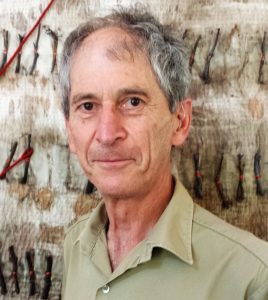 Some of you will know Evan Gellert through his involvement in the wicking beds at Eltham station and the vegetable planters outside healthAbility, or you might have met him at the Heritage Fruits Society in Templestowe. A lucky few of you will know Evan as a master cheese maker. Judy Vizzari has now interviewed Evan as a home grower. Here is how Judy introduces her write up: “Today I visited a green place which is known, unsurprisingly, as Green Place, but which is actually called Dulaiwurrong Village. Dulaiwurrong is an aboriginal word and was the name chosen by the estate’s developer, in consultation with the Wurundjeri people, when the land was sub-divided in the early 2000s. It means platypus and refers to the platypus population which once thrived in the nearby Diamond Creek. This tiny, almost hidden, ‘eco-village’, which backs onto the Diamond Creek, is just a short distance from central Eltham. Once the area was occupied by a single dwelling and was known locally as Connie’s Farmhouse. I was there to meet Evan Gellert, and his partner, Gillian Essex, who were amongst the first residents to build in the village.” She then describes her tour of their garden and Evan’s various volunteering activities. Read the full interview.
Some of you will know Evan Gellert through his involvement in the wicking beds at Eltham station and the vegetable planters outside healthAbility, or you might have met him at the Heritage Fruits Society in Templestowe. A lucky few of you will know Evan as a master cheese maker. Judy Vizzari has now interviewed Evan as a home grower. Here is how Judy introduces her write up: “Today I visited a green place which is known, unsurprisingly, as Green Place, but which is actually called Dulaiwurrong Village. Dulaiwurrong is an aboriginal word and was the name chosen by the estate’s developer, in consultation with the Wurundjeri people, when the land was sub-divided in the early 2000s. It means platypus and refers to the platypus population which once thrived in the nearby Diamond Creek. This tiny, almost hidden, ‘eco-village’, which backs onto the Diamond Creek, is just a short distance from central Eltham. Once the area was occupied by a single dwelling and was known locally as Connie’s Farmhouse. I was there to meet Evan Gellert, and his partner, Gillian Essex, who were amongst the first residents to build in the village.” She then describes her tour of their garden and Evan’s various volunteering activities. Read the full interview.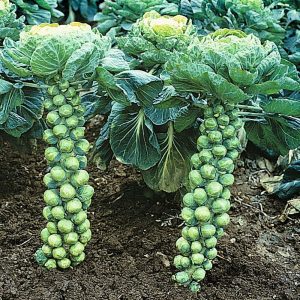 The Adams Farms, in Coldstream, are a Brussels sprout farm, perhaps best known for their annual ‘Sprout Fests’ held in the autumn of each year. Interestingly, as shown in this video, they have already started their plantings for 2018.
The Adams Farms, in Coldstream, are a Brussels sprout farm, perhaps best known for their annual ‘Sprout Fests’ held in the autumn of each year. Interestingly, as shown in this video, they have already started their plantings for 2018.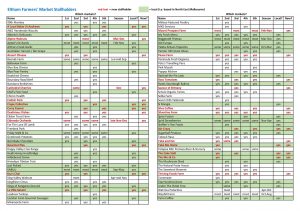 Now that future schedules have settled down, I thought that it would be a good time to publish an up-to-date list of stallholders. This is available in three different formats:
Now that future schedules have settled down, I thought that it would be a good time to publish an up-to-date list of stallholders. This is available in three different formats:
